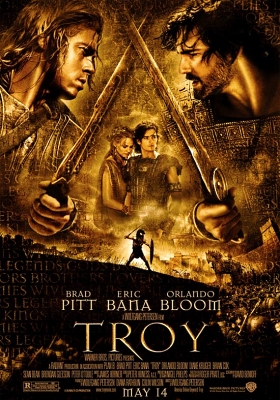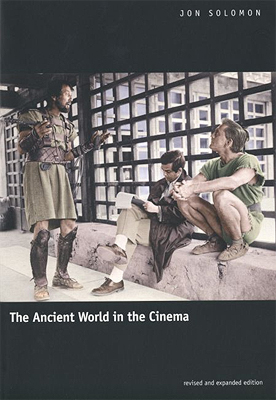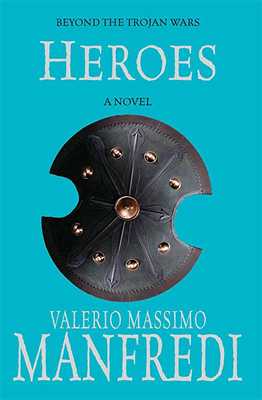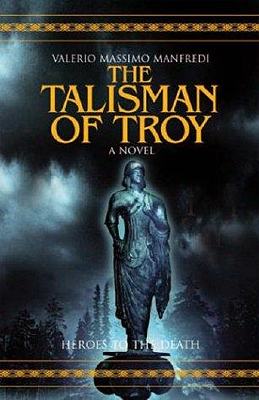
Movie
First Released: 2004
Run Time: 163 minutes (Director’s Cut: 196 minutes)
Starring: Brad Pitt (Achilles), Eric Bana (Hector), Orlando Bloom (Paris), Diane Kruger (Helen), Peter O’Toole (Priam), Sean Bean (Odysseus)
Synopsis: Brad Pitt picks up a sword and brings a muscular, brooding presence to the role of Greek warrior Achilles in this spectacular retelling of the Iliad. Orlando Bloom and Diane Kruger play the legendary lovers who plunge the world into war, Eric Bana portrays the prince who dares to confront Achilles, and Peter O’Toole rules Troy as King Priam. Director Wolfgang Petersen recreates a long-ago world of mighty warships, clashing armies, the massive fortress city and the towering Trojan Horse.
My Thoughts: May 14, 2014 marks the tenth anniversary of Troy’s theatrical release. Enough reviews of this movie have already been written that I honestly considered never posting about it at all, but I can’t pass up an anniversary. I do, however, want to keep this short; I could talk about this movie for days but I’ve chosen two things I like and two things I don’t like and am going to do my best just to stick with them.
Also, I am making absolutely no attempt in this entry to avoid SPOILERS.
· Thing I Like #1: Achilles’ Fight Scenes
Troy is the only movie I’ve seen so far that actually tries to bring the greatest warrior of the Trojan War to life on the battlefield, and just for that I’m glad it exists. I know nothing at all about fighting, but the DVD extras discuss the creation of Achilles’ fighting style in a way that makes me feel like it was impressive undertaking, and I am more than happy to believe that. The scene where he’s fighting on the beach shows an Achilles who can take on multiple enemies at once, who can predict their movements based on very little information, who uses every advantage he has and who knows exactly what to do to win a battle as quickly as possible. My favourite part comes at 2:24 in the linked clip, where he throws his shield onto his back less than a second before it’s pierced by an arrow. I like this scene so much that I am even willing to forgive the moments where the editing or special effects are way too obvious. I do have some problems with Achilles in this movie, but just in terms of his battle scenes, in terms of portraying him as a man who was born for war, Troy is a huge improvement over every other Trojan War movie I’ve seen.
Related, I also love how the fight between Hector and Achilles has them alone together on the battlefield. There honestly might not be anything I would change about that scene.
· Thing I Don’t Like #1: Patroclus
It honestly doesn’t bother me that Troy makes Achilles and Patroclus cousins. What does bother me is that, for all that we are constantly told how close they are, they never seem to be close at all. The actors who played them are twenty years apart, they fight in every scene they have together, Achilles’ relationship with Briseis is given priority, and when Patroclus goes onto the field in Achilles’ armour, Achilles doesn’t even know. I would be okay with this distance between them if it were the movie’s intention to create distance between them, but based on Achilles’ reaction to Patroclus’s death I would say it clearly isn’t. Every time I watch Troy’s Achilles swear to revenge Patroclus’s death, I find myself thinking, “But Achilles … did you even like that guy??”
It also really, really irritates me to think that a major reason Troy creates so much distance between Achilles and Patroclus is because of the political climate at the time the movie was in production. Like it wasn’t enough to make them cousins – Troy also has to make sure these two men don’t even act like friends, just to make sure no one can accuse them of having a homosexual relationship. The thought that this movie weakened its own story in order to appease a certain demographic drives me up the wall.
· Thing I Like #2: Odysseus
Troy’s Odysseus is definitely a watered-down Odysseus in that, apart from his imagining the Trojan Horse, his cleverness only shows itself through one-liners. The film attempts to portray him as the man of many turns, but isn’t terribly successful. For example, in his first scene in the director’s cut, he convinces Agamemnon’s messengers that he’s someone else only to immediately admit he’s bluffing – why?? Even so, I’m glad that this Odysseus is in the movie. All the other characters are so serious that I think Odysseus and his wry comments are almost necessary. I also really love his friendship with Achilles and, no matter how many problems I have with the movie that precedes it, I never fail to tear up at his ending monologue.
· Thing I Don’t Like #2: Agamemnon
I don’t have much to say about Troy’s Agamemnon because there isn’t much to him. He’s completely one-dimensional and has no redeeming qualities. Even doing my best to accept this character as the one-note villain of a summer blockbuster, I kind of hate every scene he’s in. Surely they could have given him a little nuance? It’s like one minute this movie is quoting Homer and casting Peter O’Toole in one of the most famous scenes in Western literature, and the next minute Agamemnon is shouting about how evil he is. In the end I don’t quite know what kind of movie Troy wanted to be.
Related, I also wish this movie had taken care to be a little bit subtle about the whole glory aspect of the story. The search for glory is a huge part of the Iliad and I think the questions it raises both directly and indirectly are still extremely relevant today. Is it worth trading your life for fame? Does a life have meaning if it’s forgotten once it’s over? I love this aspect of the story and I hate how Troy deals with it. The scene where Agamemnon and Achilles argue about which one of their names will be remembered is, in my mind, the worst offender. It’s so busy hitting you over the head with the point it’s trying to make that it forgets to be at all compelling.
· I will be honest with you: in the end, Troy is my favourite of the Trojan War movies I’ve seen so far, although this has less to do with how it handles the story or the characters and more to do with the fact that, at the moment at least, it’s the only Trojan War movie made on a Hollywood budget during my lifetime. Actually, I think this is also why I get so irritated by the parts of it that I don’t like – because it’s the only one of its kind, I can’t seek out others that I might enjoy more, like I constantly do with Trojan War novels. For all its faults, though, I have watched this movie at least twice a year since it was released, and I’m sure I’ll continue to watch it at least twice a year until Hollywood decides it’s time to remake it.
Watch: the trailer
Buy it at: Amazon.com (regular edition), Amazon.com (director’s cut), Amazon.com (director’s cut collector’s edition), Amazon.ca (regular edition), Amazon.ca (director’s cut), Amazon.ca (director’s cut collector’s edition)


